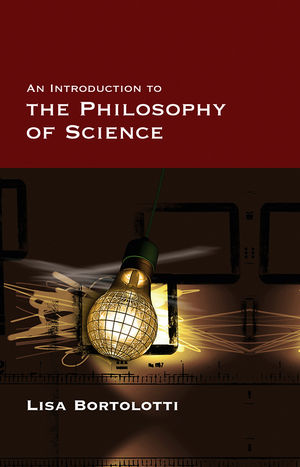An Introduction to the Philosophy of ScienceISBN: 978-0-7456-3538-5
Hardcover
256 pages
December 2008, Polity
 This is a Print-on-Demand title. It will be printed specifically to fill your order. Please allow an additional 10-15 days delivery time. The book is not returnable.
Other Available Formats: Paperback
|
||||||
Chapter one: DEMARCATION.
1.1. Science and Non-science.
1.1.1. Analytic and synthetic statements.
1.1.2. The ‘elimination’ of ethics.
1.1.3. Metaphysics as poetry.
1.2. Science and Pseudoscience.
1.2.1. Is astrology falsifiable?.
1.2.2. Context-dependent factors in demarcation.
1.2.3. “Anything goes”.
1.3. Natural and Social Sciences.
1.3.1. Laws and experiments in the social sciences.
1.4. What is Scientific Research?.
1.4.1. Procedural questions.
1.4.2. Functional questions.
1.4.3. Delimiting research.
1.5. Good and Bad Science.
Summary.
Preview of future attractions.
Issues to think about.
Further resources.
Chapter two: REASONING.
2.1. Ways of Reasoning.
2.1.1. Justification and truth.
2.1.2. Deductive arguments.
2.1.3. Non-deductive arguments.
2.1.4. Reasoning in scientific practice.
2.2. The Scientific Method: Induction.
2.2.1. Innovations in the rise of modern science.
2.2.2. Thought experiments.
2.3. The Problem of Induction.
2.3.1. Can we dissolve the problem of induction?.
2.3.2. Attempting a solution to the problem of induction.
Summary.
Preview of future attractions.
Issues to think about.
Further resources.
Chapter three: KNOWLEDGE.
3.1. What is a Theory?.
3.1.1. Conceptions of scientific theories.
3.1.2. The hidden complexity of observation.
3.2. Theory Confirmation.
3.2.1. The paradox of the ravens.
3.2.2. Alternative accounts of confirmation.
3.2.3. The new riddle of induction.
3.2.4. Attempted solutions to Goodman’s riddle.
Is there something wrong with ‘grue’?.
Lawlikeness.
3.3. Models of Explanation.
3.3.1. Hempel’s models of explanation.
3.3.2. Relevance, symmetry and causal relations.
3.3.3. A pragmatic approach to explanation.
Summary.
Preview of future attractions.
Issues to think about.
Further resources.
Chapter four: LANGUAGE AND REALITY.
4.1. Meaning, Reference and Natural Kinds.
4.1.1. How terms get their meaning.
4.1.2. Twin-Earth.
4.1.3. Intuitions about natural kinds.
4.2. Implications of Descriptivism.
4.2.1. Meaning incommensurability.
4.2.2. Partial reference and imperfect translations.
4.3. Realism.
4.3.1. Realism in the philosophy of science.
4.3.2. Arguments against realism.
The Pessimistic Meta-Induction.
Underdetermination.
Duhem-Quine Thesis.
4.4. The Realism Debate.
4.4.1. Alternatives to realism.
Instrumentalism.
Constructive empiricism.
NOA: Realism is just metaphysical foot-stamping.
4.4.2. Defending realism.
Structural realism.
Internal realism.
Summary.
Preview of future attractions.
Issues to think about.
Further resources.
Chapter five: RATIONALITY.
5.1. Revolutions.
5.1.1. Kuhnian revolutions.
5.1.2. The Rationalists.
5.2. Paradigm Shifts.
5.2.1. The “discovery” of oxygen.
5.2.2. The Chemical Revolution as an illustration of Kuhn’s theory.
5.3. Beyond Revolutions.
5.3.1. Research programs.
5.3.2. Styles of reasoning.
5.3.3. Theory choice.
Summary.
Preview of future attractions:.
Issues to think about:.
Further resources.
Chapter six: ETHICS.
6.1. Instrumentalization.
6.2. Ethical Constraints on Research Objectives.
6.2.1. Two notions of disability.
6.2.2. Objections to enhancement.
6.2.3. Do we have a moral obligation to enhance?.
6.3. Ethical Constraints on Research Methods.
6.3.1. Methodological deception in psychology.
6.3.2. Objections to methodological deception.
6.3.3. Benefits of methodological deception.
6.3.4. Deception outside psychology.
6.4. Ethical Constraints on Scientific Research.
Summary.
Issues to think about.
Further resources.
Conclusion: SCIENCE AS AN ACTIVITY.
Glossary.
Thematic Bibliography.
General Readings on Philosophy of (the) Science(s).
On Science, Pseudoscience and Bad Science.
On Natural vs. Social Sciences.
On Induction and Inductivism.
On Thought Experiments.
On the Nature of Scientific Theories and Models.
On Confirmation and Probability.
On Theory and Observation.
On Explanation.
On Laws.
On Meaning, Reference, and Natural Kinds.
On ‘Species’.
On ‘Jade’.
On Incommensurability.
On Realism.
On Underdetermination and the Pessimistic Meta-Induction.
On Revolutions and Progress.
On Science and Society and Research Ethics.
On Enhancement, Disability and the Ethics of Genetic Engineering.
On the Ethics of Scientific Research involving Animals.
On Deception in Psychological Research



